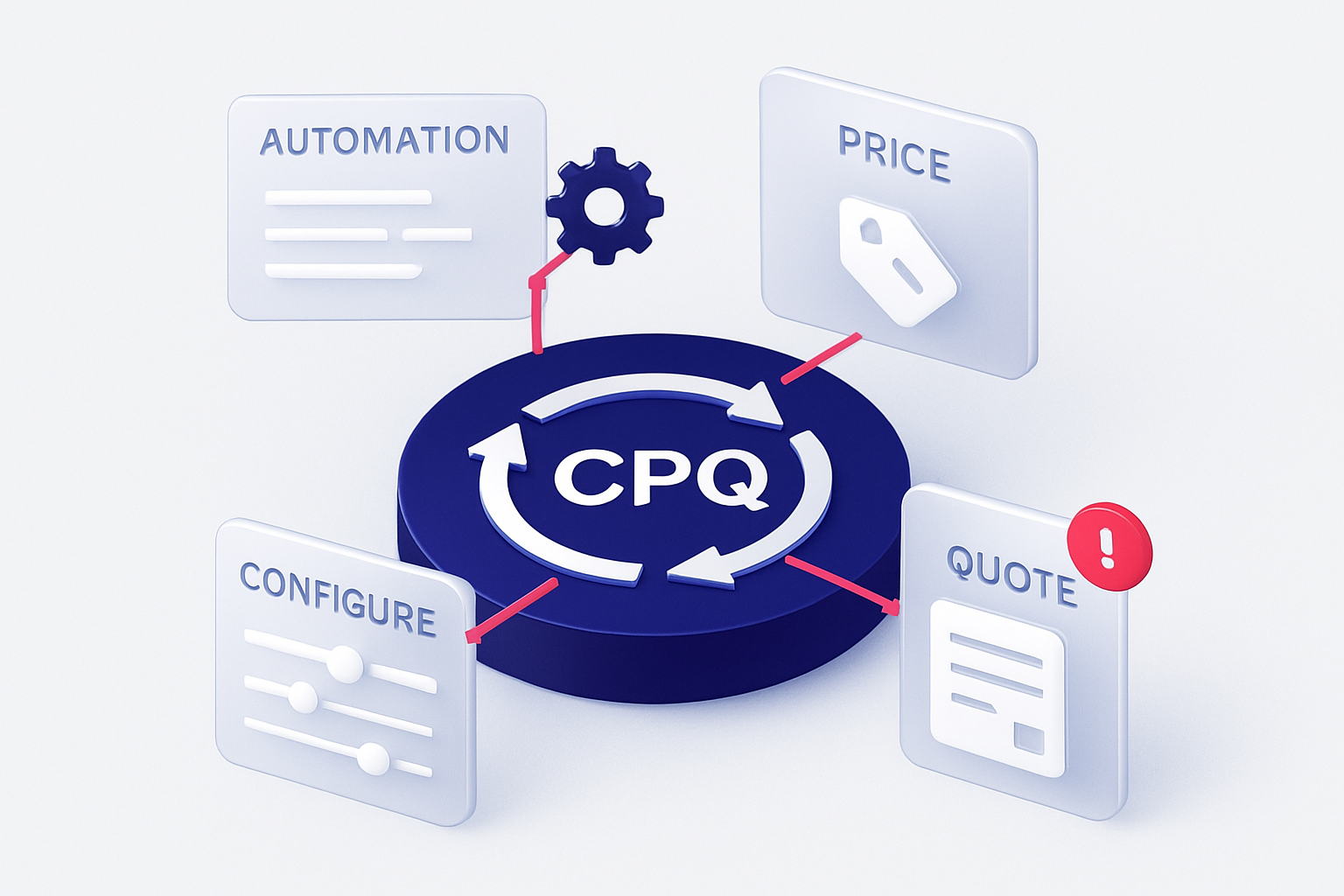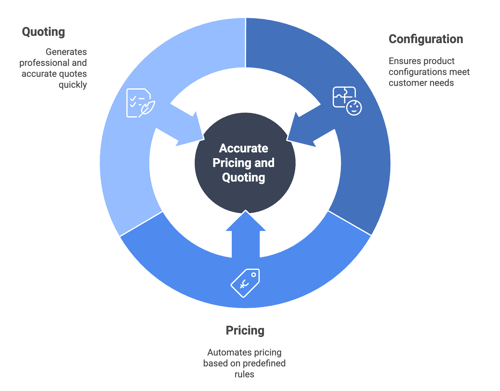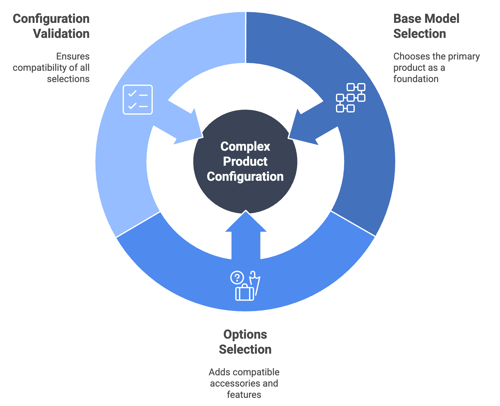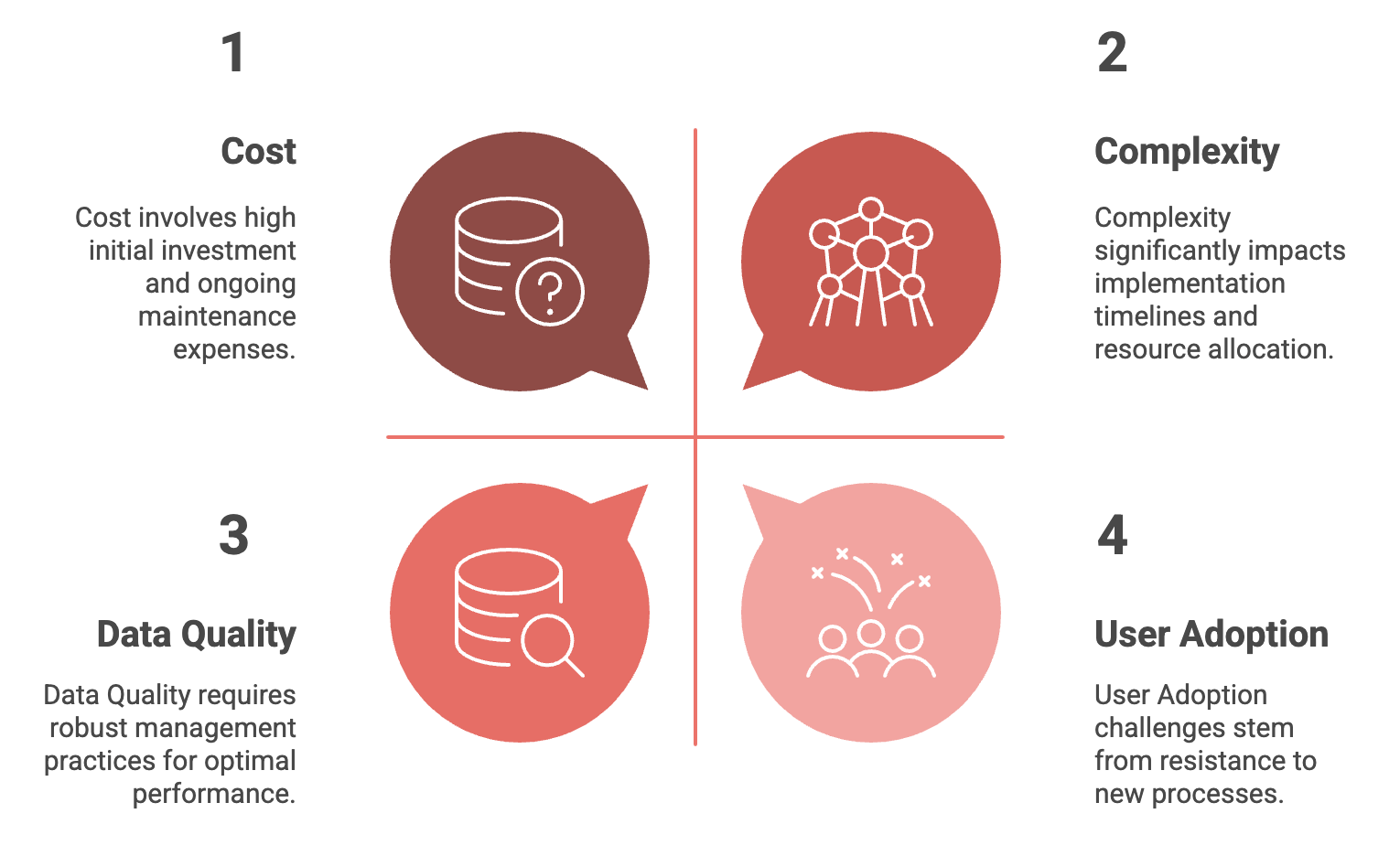CPQ Software Guide: Everything Sales Leaders Need to Know in 2025

Imagine if your sales team could cut down on paperwork and focus more on closing deals. CPQ (Configure, Price, Quote) software makes this possible by streamlining quoting and pricing tasks. With CPQ, companies typically see a 73% reduction in time spent on quote generation and a 17% increase in conversion rates12.
In this blog, we address the most frequently asked questions about CPQ, from its benefits to its costs and future trends. Explore how CPQ can enhance your sales efficiency and give your business a competitive edge.
TABLE OVERVIEW
2. Why Your Business Needs CPQ
3. Key Benefits of Implementing CPQ Systems
4. What CPQ Can Accomplish for Your Business?
5. What factors influence the cost of CPQ solutions?
6. Which Types of Products and Services are Configurable with CPQ?
7. How Does CPQ Manage Complex Product Configurations?
8. How do CPQ tools manage pricing rules and discounts?
9. Streamlining Quote Revisions and Approvals
10. What are the limitations of CPQ?
11. What are the key challenges while selecting a CPQ platform?
12. Future Trends and Innovations in CPQ Solutions
Which companies provide leading CPQ solutions
1. What is CPQ-software
CPQ stands for Configure, Price, Quote.
It’s a product pricing software solution designed to help businesses accurately define the price of goods across a huge spectrum of variables, leveraging at the same time automated quoting. Its primary functions include:
- Configuration: Ensuring product configurations are accurate and aligned with customer requirements.
- Pricing: Automating and standardizing pricing based on predefined rules and conditions.
- Quoting: Generating professional and accurate quotes quickly.

2. Why Your Business Needs CPQ-software
Strategic Advantages of CPQ Adoption
The adoption of CPQ solutions has become an operational necessity for businesses to have a strategic advantage, that directly impact operational efficiency and customer satisfaction:
- Streamlined Sales Processes: CPQ automates complex sales tasks, enabling sales teams to focus on the relationship-building side of selling, closing deals faster.
- Error Reduction and Pricing Consistency: Automated configurations and pricing rules ensure accuracy and consistency in quoting, decreasing errors that could harm financial predictability.
- Enhanced Customer Experience: Swift and accurate quote generation through CPQ systems improves customer satisfaction and strengthens client relationships, driving higher retention rates.
3. Key Benefits of Implementing a CPQ Tool
Implementing a CPQ (Configure, Price, Quote) system can transform your sales process in many ways. Here’s why you should consider it:
- Boosted Sales Productivity: Imagine cutting down the time your team spends on paperwork by 73%. CPQ systems automate these tedious tasks, freeing up your sales reps to focus on what they do best—closing deals1.
- Enhanced Pricing and Quoting Accuracy: No more guesswork. With CPQ, your pricing and quoting are automated and precise, reducing errors by up to 40%. This means faster, more accurate responses to customer inquiries2.
- Elevated Customer Satisfaction: Speed and accuracy in quoting don’t just benefit your team—they delight your customers. CPQ systems help you deliver quotes faster and more professionally, boosting conversion rates by 17% and building stronger customer relationships1.
- Optimized Sales Processes: CPQ tools guide your sales team through the best product configurations and upsell opportunities, making the sales process smoother and more effective. Plus, they can shorten your sales cycle by 28%, letting you close deals quicker3.
In short, CPQ systems streamline your sales operations, making everything from quoting to closing faster and more accurate.
4. What CPQ Can Accomplish for Your Business?
Transforming Business Operations with CPQ
CPQ systems deliver transformative capabilities that optimize sales processes and enhance business outcomes:
- Simplified Product Configurations: CPQ streamlines the customization of products to meet diverse customer needs swiftly and accurately, reducing lead times and improving operational efficiency.
- Automated Pricing and Quoting: By automating pricing strategies and configurations, CPQ ensures consistency and accuracy in every quote generated, enabling faster response times to customer inquiries.
Read more on How CPQ Solutions Support Your Sales Force - here
5. What factors influence the cost of CPQ solutions?
When it comes to CPQ (Configure, Price, Quote) solutions, several factors can impact the cost:
- Setup and Customization: Initial costs cover setting up the CPQ system and tailoring it to your specific needs. This includes configuring the software and integrating it with your existing CRM or ERP systems.
- Licensing and Subscription: CPQ systems usually involve licensing or subscription fees. These costs depend on the number of users, the features you choose, and whether you go with a cloud-based or on-premises solution.
- Training and Support: To get your team up to speed, you’ll need to budget for training and support. This investment ensures that your team can effectively use the system and get help when needed.
- Integration Complexity: If your CPQ needs to work with other systems, such as CRM or ERP, this can add to the cost. Complex integrations might require extra customization and support.
- Scalability: As your business grows, you may need to scale your CPQ system to handle more users or transactions, which can affect the overall cost.
Return on Investment (ROI): Although there are initial costs, many businesses find that CPQ solutions pay off through increased efficiency and faster, more accurate quoting.
By considering these factors, you can better understand the total cost and benefits of a CPQ solution for your business.
6. Which Types of Products and Services are Configurable with CPQ Software?
Versatility of CPQ Tools
CPQ tools handle a wide range of products and services, including:
- Manufacturing Equipment: Complex machinery offering multiple configuration options tailored to specific customer needs.
- Software Packages: Customizable software solutions with various modules and features.
- Subscription Services: Flexible service offerings including different tiers, durations, and optional add-ons to cater to varying customer preferences.
industry-specific CPQ applications
- Manufacturing: CPQ facilitates the configuration of intricate machinery according to precise customer specifications, ensuring optimal functionality and performance.
-
Telecommunications: CPQ aids in bundling diverse service plans and devices, providing tailored solutions that meet specific customer demands effectively.
7. How Does CPQ Manage Complex Product Configurations?
Handling Complexity with Ease
CPQ systems adeptly manage complex product configurations using:
- CPQ Rules-Based Systems: Ensuring configurations adhere to predefined rules, maintaining accuracy and compliance with technical specifications.
- Dynamic Interface for Product Selection: Empowering sales representatives to intuitively select and have customizable product options through user-friendly interfaces.
Step-by-Step Example
To illustrate:
- Select Base Model: Choose the primary product.
- Add Options: Select compatible options and accessories.
- Validate Configuration: Ensure all selections are compatible.

8. How do CPQ tools manage pricing rules and discounts?
Automating Pricing and Discounts
CPQ tools automate pricing and discounts, ensuring consistency and accuracy. They can handle:
- Volume Discounts: automated pricing rules based on order quantity, ensuring cost-effectiveness for bulk purchases.
- Customer-Specific Pricing: Tailoring prices to different customer segments, optimizing competitiveness and customer satisfaction.
- Geographical Pricing: Adapting pricing strategies to regional markets, reflecting local economic conditions and competitive landscapes.
|
Pricing Management |
Manual Pricing |
CPQ-Managed Pricing |
|
Accuracy |
Prone to errors |
Automated and accurate |
|
Efficiency |
Time-consuming |
Fast and efficient |
|
Consistency |
Inconsistent |
Standardized |
9. How do CPQ systems streamline quote revisions and approvals?
Efficient Quote Management
CPQ systems enhance efficiency in the revision and approval process through:
- Automated Workflows: Quotes are automatically routed to the relevant stakeholders for swift approval, reducing delays and improving workflow efficiency.
- Tracking and Notifications: Automated notifications keep stakeholders informed about the status of quotes, ensuring timely actions and minimizing bottlenecks.
Checklist for Businesses
To optimize quote management:
- Define Approval Workflows: Clearly establish and automate the approval chain to expedite decision-making and ensure accountability.
- Set Up Notifications: Implement automated notifications to alert stakeholders promptly about pending approvals, facilitating timely responses.
- Track Revisions: Maintain comprehensive records of all quote revisions to enhance transparency and support audit trails.
10. What are the limitations of CPQ?
Potential Drawbacks
While CPQ systems offer substantial benefits, they also present certain limitations:
- Complexity: Initial setup and customization can require significant resources and expertise, impacting implementation timelines.
- Cost: There is a high initial investment and ongoing costs associated with licensing, maintenance, and customization of CPQ systems.
- Data Quality: CPQ systems depend heavily on accurate and up-to-date data for optimal performance, necessitating robust data management practices.
- User Adoption: Resistance from sales teams accustomed to traditional or legacy processes may pose challenges in adopting CPQ tools effectively.

11. What are the key challenges while selecting a CPQ platform?
Key Considerations
When selecting a CPQ platform, consider:
- Customization Needs: Ensure the platform can be tailored to your specific requirements.
- Integration Capabilities: Check compatibility with existing CRM and ERP systems.
- User Adoption: Plan for training and change management.
- Scalability: Ensure the solution can grow with your business.
- Vendor Support: Evaluate the quality of customer support.
Tips for Success
- Pilot Programs: Test the CPQ solution with a small team before a full rollout.
- Vendor Research: Read reviews and request demos from multiple vendors.
- Feedback Loops: Collect and act on feedback from users.
12. Future Trends and Innovations in CPQ Solutions
Looking Ahead
The future of CPQ involves advancements like:
- AI-Driven Insights: Using artificial intelligence to provide deeper insights and recommendations.
- Enhanced Integration: Improved connectivity with other business systems.
- User-Friendly Interfaces: More intuitive and user-friendly interfaces.
- Self-Service Quoting: Empowering customers to generate their own quotes.
Industry Analyst Predictions
Analysts predict a growing trend towards AI-driven CPQ solutions that will further streamline sales processes and provide more accurate forecasting.
Conclusion:
In conclusion, CPQ solutions are critical for businesses looking to optimize their sales processes. By automating configuration, pricing, and quoting, CPQ tools help companies achieve greater efficiency, accuracy, and customer satisfaction.
Which companies provide leading CPQ solutions?
For businesses considering CPQ (Configure, Price, Quote) solutions, here are some of the industry's leading providers, including HubSpot:
-
DealHub CPQ: DealHub offers a powerful, no-code CPQ platform that integrates seamlessly with HubSpot, Salesforce, and other CRMs. Known for its rapid implementation (8-12 weeks vs. 6+ months for legacy systems), DealHub provides guided selling, digital deal rooms, and advanced approval workflows ideal for mid-market and enterprise organizations.
-
Oracle CPQ Cloud: Oracle provides a comprehensive CPQ solution tailored for enterprises, automating complex pricing and quoting processes to drive sales effectiveness.
-
SAP CPQ: SAP offers a scalable CPQ solution integrated with their ERP systems, enabling businesses to streamline configuration, pricing, and quoting for improved sales performance.
- IBM CPQ: IBM delivers a flexible CPQ solution designed to simplify sales processes, optimize pricing strategies, and enhance customer satisfaction through automation.
- Microsoft Dynamics 365 CPQ: Microsoft includes CPQ capabilities within their Dynamics 365 suite, helping businesses accelerate sales cycles with automated quoting and proposal management.
- HubSpot CPQ: HubSpot offers a user-friendly CPQ solution integrated with their CRM platform, empowering businesses to streamline quoting processes and drive sales growth.
-
Important Note: Salesforce CPQ is being discontinued in Q4 2025, with Salesforce transitioning customers to Revenue Cloud. Organizations currently using Salesforce CPQ should evaluate migration options, with many choosing solutions like DealHub for comparable functionality with faster implementation and lower total cost of ownership.
Want to explore the possibilities with HubSpot? Join us during our Live Webinar!

